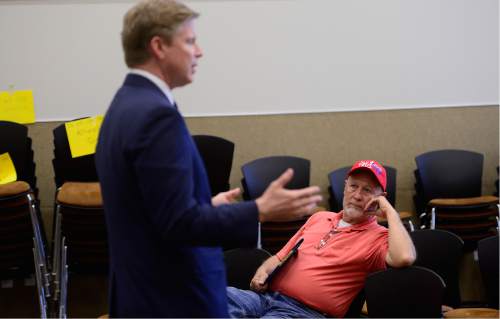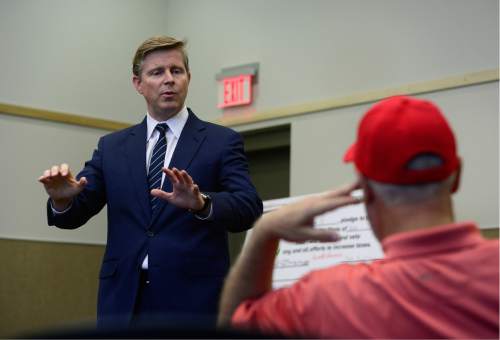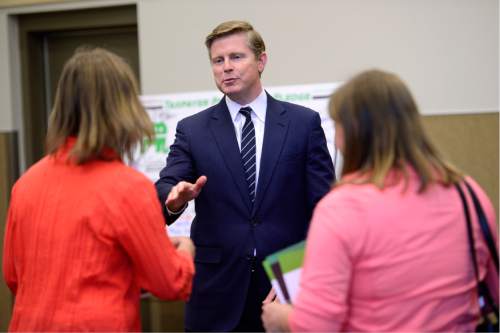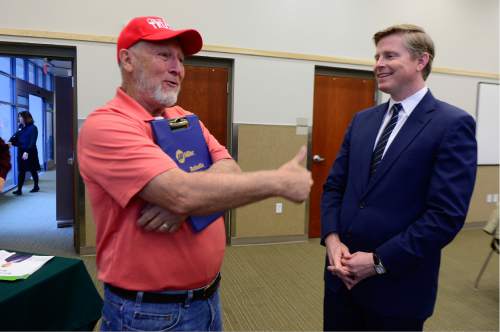This is an archived article that was published on sltrib.com in 2016, and information in the article may be outdated. It is provided only for personal research purposes and may not be reprinted.
Just five people — including three Republican state convention delegates — drove through a hard rainstorm last week for a midday meeting with GOP gubernatorial candidate Jonathan Johnson at the library in Magna.
The small audience "is typical for a daytime meeting," Johnson said. "People have to work. But at our night meetings, we get 100 delegates or more."
He figured some daytime gatherings are needed to reach the 4,000 state delegates in the 30 days between when they were elected and the state convention Saturday. "We're fighting for them one by one, two by two and whatever we can get."
On this day, Johnson, chairman of Overstock.com, held delegate meetings at his campaign office, at libraries in Magna and Kearns, and at county conventions in Heber and Morgan, "and I make phone calls in between."
His GOP opponent, Gov. Gary Herbert, began the same day with a delegate breakfast in St. George at 7:30 a.m., a pastry meeting with delegates in Cedar City at 10:30, milkshakes later with delegates in Fillmore, followed by meetings at the county conventions in Heber and Morgan.
"And he was on the phone with delegates while he was traveling," said his campaign manager, Marty Carpenter. "I don't think he finished until after 10 p.m."
It shows the sort of hard, hand-to-hand political combat that occurs in Utah's caucus-convention system — which critics say gives the few delegates too much power, but which supporters say forces candidates to listen to real people and their concerns.
For the first time, candidates this year could also qualify for the primary election by collecting signatures — which Herbert did by paying $59,600 to gather the required 280,000 names. Johnson chose not to collect signatures.
If Herbert wins 60 percent of delegate votes, he eliminates Johnson and fellow GOP challengers Nate Jensen and Carlos Tavares Jr. from the primary election and proceeds directly to the general election. But Herbert cannot be eliminated in the convention.
"You're not voting to put the governor on the primary ballot," because his signature gathering already has him there, Johnson told his small audience of delegates. Instead, "You're voting to put me on, or off, the ballot."
Republican Party leaders have sued the state, trying to overturn the new law that allows signature gathering. So Johnson tries to use Herbert's decision to collect signatures against him with delegates, who — not surprisingly — tend to like the system that elected them.
"It is important to campaign this way," said Johnson. You hear what real concerns are around the state. I would hate to see the caucus-convention system disappear."
That resonated with delegate Tiina Fridley from Lake Point, Tooele County, who attended Johnson's Magna meeting.
"The caucus-convention system is the only thing that gives rural Utah any power" and makes candidates pay attention to it, she said. "Otherwise, they would just flood the Wasatch Front with ads and there would be no reason to hold meetings like this."
At that meeting, she peppered Johnson with questions about education and home schooling, while others asked about taxes, public lands, gun rights and even how he exercises. She attended an earlier meeting for Herbert's campaign with Lt. Gov. Spencer Cox to ask similar questions.
"I like it when the candidates are available and there's a chance to ask questions, because that's when you really hear how prepared they are," Fridley said. "They can have their prepared spiel, but when they get off of that because someone asks a question is when you see what they really think."
Benjamin Lamb, a delegate from Taylorsville, agreed. He attended Johnson's Magna meeting and went to a breakfast meeting with Herbert at Mimi's Cafe, which, he said, "was delicious."
"I'd rather do this than have signatures. Signatures could be bought," he said, adding that delegate meetings make candidates listen to and address concerns from him and others statewide.
Lamb said he can then "go back to the neighborhood and talk to the people who elected me as their delegate about what the candidates really say," noting that each side seems not to describe the other quite accurately.
Pete Olson, a West Valley City resident who ran unsuccessfully to be a state delegate, still attended two of Johnson's delegate meetings because they were advertised as open to the public.
"I still had some questions after his meeting last night in Layton," he said. So Olson went to the Magna meeting to ask more. Afterward, he said, "I don't agree with him on everything. But at least he was honest with me. That means a lot because I am tired of politics as usual."
Herbert said he likes the caucus-convention system. But he notes the attorney general said that because of legal challenges to the new system, pursuing both signatures and convention nomination was the only way to ensure appearing on the ballot.
"So prudence is part of being a common-sense Republican. That's why I have taken both approaches," Herbert said in a recent debate.
The governor "really enjoys spending time with delegates and making his case to them," said Carpenter, his campaign manager. "It helps him understand what their perspectives are, and helps him explain in greater detail what he does as governor."
Carpenter said the truly hard part for staffers "is to try to get the governor to leave" the meetings and keep on schedule, because he loves to linger and answer questions.
Herbert has tried to have several events each night in recent weeks, and Carpenter jokingly compared it to a performer in Las Vegas "doing two or three shows a night."
Herbert has also used some higher-tech ways to reach out to delegates, including conducting tele-town hall meetings, where they can phone in and listen to and ask questions.
Another part of the battle for delegates: the mountains of campaign literature and material providing detailed policy positions.
"I've got an 18-page policy guide and a DVD to let people know what I stand for," Johnson said of the information he sent to delegates. Campaigns could not afford to send that much to all voters.
Between all the mail and meetings with both the Johnson and Herbert campaigns, "I've had all my questions answered," said Gwen Ruebush, another delegate from Lake Point. But with time running out, she has yet to make up her mind. "Both are honest, good and true people. So I am still undecided."









